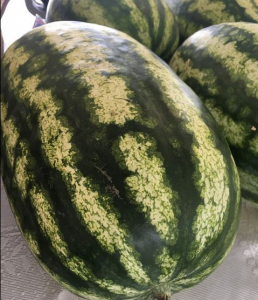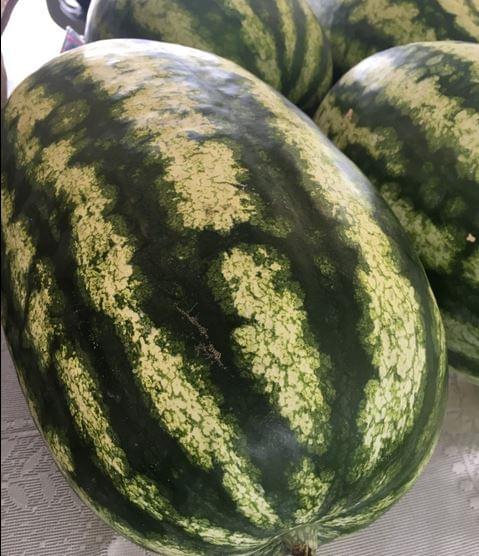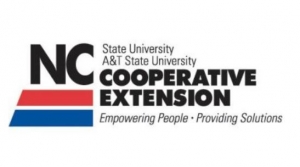Nothing says summer like watermelons. Watermelons are often a must at our summer cookouts and are a wonderful treat during hot summer days.
Watermelons are grown across the United States. The top four states are Texas, Florida, Georgia, and California producing 69% of all grown in United States. In terms of production, watermelon is one of the three top crops produced in the United States, along with onions and head lettuce. Over 113,000 acres of watermelons were grown in the United States in 2017, producing 20 million pounds. All but about 24% of domestic consumption of watermelons comes from United States growers; the rest comes primarily from Mexico or Central American countries. China, however, is the leading producers of melons.
North Carolina ranks 8th in the United States for watermelon production (2018). Wayne County is one of the top watermelon producing counties in North Carolina. Over 6,500 acres of watermelons were grown in North Carolina in 2017 with a value of close to $21,000.
Watermelons are grown for the fresh market. Large-scale producers (usually more than 20 acres) generally use brokers who provide the marketing services to the producers. Watermelons are in season from July through August. It takes 80 to 95 days for watermelon to become full-grown. There are many varieties of watermelons (over 1,200) that vary in size and flavor. The four main categories are seeded, seedless, icebox, and yellow/orange. Seedless varieties are in increasing demand. Watermelons do depend on honeybees for pollination, without honeybees we would not be enjoying watermelons.
With the seedless varieties being so popular, a common watermelon question is usually “How do you get a seedless watermelon?” Let’s see if we can clarify without diving too deep into a genetics or plant breeding lesson. Getting a seedless watermelon is all about the genetics, seedless watermelons are triploid meaning they have three sets of chromosomes (normally they are diploid meaning two chromosomes). This odd number of chromosomes results in them being sterile and not producing seeds. They become triploid by cross breeding a male diploid (2 sets of chromosomes) with a female tetraploid (4 sets of chromosomes). When breeding for new varieties watermelon plants have separate male and female flowers, so the undesirable flower can be removed to create the cross for a seedless watermelon. That’s the story about how we get a seedless watermelon!
Watermelons can get large, next time check out some of the largest watermelon entries at the state fair or local fairs in our area. The heaviest watermelon to date weighed in at 350.5 pounds and was grown by Guinness World Record holder Chris Kent, of Sevierville, TN in 2013.
Watermelons are made up of approximately 92% water. Watermelon is cholesterol, fat, and sodium free. Is an excellent source of vitamins A and C, and is only 80 calories per a 2-cup serving. Watermelons is an excellent value with just one large watermelon feeding up to three dozen people making it one of the most budget-friendly fruits.
So how do you go about selecting a ripe watermelon? Ever seen someone thumping a watermelon to determine if it is ripe and wondered what they are listening for? A ripe melon should have a nice, deep sound, like a drum or knocking on a door. Another, maybe easier way to determine if a watermelon is ripe and ready to eat is to look at the bottom of the watermelon. The bottom of watermelons where it was touching the ground when in the field should be a creamy yellow in color instead of white.
Be sure to include fresh, local watermelons with your summertime meals and celebrate the season by purchasing fresh, local watermelons. Several vendors at the Farm Credit Farmers Market now have watermelons for sell. The market is open on Thursdays and Fridays from 10am to 5:30pm and Saturdays from 9am to 2pm. The market is located behind The Maxwell Center at 3114 Wayne Memorial Drive, Goldsboro.
Jessica Strickland is an Agriculture Extension Agent, specializing in horticulture for North Carolina Cooperative Extension in Wayne County.

(Photo Credit: J. Strickland)


